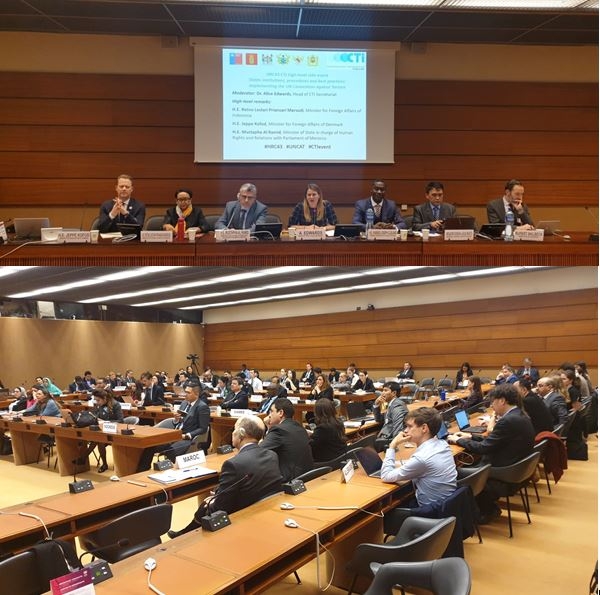HRC43: States express solidarity against torture at major CTI event
On the opening day of the 43rd session of the UN Human Rights Council, 24 February 2020, the Convention against Torture Initiative (CTI) hosted a high-level side-event on “States institutions, procedures and best practices: Implementing the UN Convention against Torture” at the Palais des Nations in Geneva. The event was attended by more than 70 persons, including representatives of 26 UN Member and Observer States from all geographical regions.

The event was opened by CTI core State Ministers, H.E. Retno Lestari Priansari Marsudi, Minister for Foreign Affairs of Indonesia, H.E. Jeppe Kofod, Minister for Foreign Affairs of Denmark, and H.E. Mustapha Al Ramid, Minister of State in charge of Human Rights and Relations with Parliament of Morocco.
Speaking on UNCAT implementation, Minister Marsudi of Indonesia highlighted the benefits of international cooperation and “peer-to-peer learning in accordance with CTI’s core principle of State to State cooperation”, which she said “can assist countries to carry the Convention [against Torture] into action”.
In his remarks, Minister Kofod of Denmark encouraged both Convention States parties and non-States-parties to “continue to work on strengthening national safeguards to prevent torture”, invited those who have not yet joined UNCAT to do so and offered CTI’s technical assistance and support for implementation.
Minister Al Ramid shared Morocco’s reform efforts to align its laws, policies and practices with the provisions of UNCAT. He encouraged other States to “engage with strong political will in reforms that require a long-term effort”, mentioning such measures as “aligning national legislation with relevant international standards, creating appropriate monitoring mechanisms, and providing ongoing training programmes, capacity-building and human rights education”.
Following the high-level opening remarks, Dr. Alice Edwards, Head of the CTI Secretariat, moderated an interactive discussion with H.E. Ramses Joseph Cleland, Ambassador and Permanent Representative of Ghana to the United Nations in Geneva; Brigadier General Dr. Agus Irianto, Head of Research, Data and Information Center of the National Narcotics Board of Indonesia; and Mr. Rupert Skilbeck, Director of REDRESS. They shared their experiences, good practices as well as challenges in implementing the Convention:
- Ghana noted the benefits they gained from cooperating with UN anti-torture mechanisms such as the UN Special Rapporteur on Torture and the Subcommittee on Prevention of Torture, which had informed policy-making on torture prevention strategies and Ghana’s ambitious prison reform and decongestion process.
- Indonesia explained their success in rolling out rapport-based investigative interviewing through training and capacity building, as well as a suite of regulations guiding appropriate police conduct. Indonesia organises an annual “training of trainers” on investigative interviewing for mid-career and senior level police officers, in which they include participation from invited ASEAN and Pacific countries.
- On the important principle of UNCAT that evidence obtained through the use of torture or ill-treatment shall be excluded from any proceedings, Mr. Skilbeck emphasised clear guidelines, legal requirements and procedures to effectively enforce the non-admission of torture-tainted evidence. A first step would be to review existing codes of conduct and regulations applying to judges, prosecutors, police and medical practitioners, and adjust them accordingly. It was emphasised that this principle is best accompanied by an effective implementation of other legal and procedural safeguards, such as audio and video recording of interviews, applying non-coercive interviewing methods, or guaranteeing the right to have a lawyer present during questioning.
- Changing mindsets in policing and the criminal justice system is a slow process, and it takes several years to see a real cultural shift in practices. It was underlined that garnering support from the greater public and relevant government institutions can be one of the main drivers of change.
The event launched CTI’s latest implementation tools, on complaints and investigations, and advertised a forthcoming tool on non-admission of torture evidence. Concluding the event, Dr. Edwards invited all UN Member States to join CTI’s Group of Friends and remarked, “The outstanding attendance at this event is a positive expression of solidarity with the cause of torture prevention and eradication.”
***
For more information on CTI’s catalogue of UNCAT Implementation tools, see here.
CTI’s latest tool on Complaints and Investigations is available here.
CTI’s Training Tool on Investigative Interviewing for Criminal Cases is available here.
For governments interested in learning more about CTI’s work and how can CTI support their efforts towards ratification and/or implementation of UNCAT, please contact info@cti2024.org.

